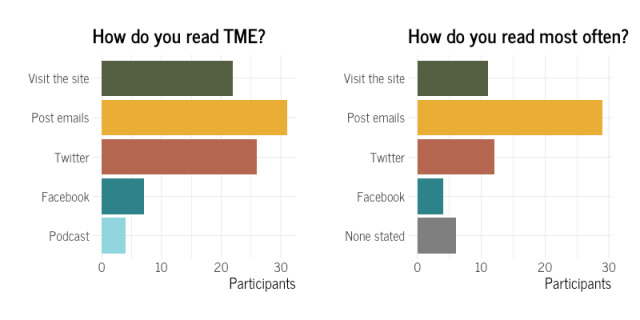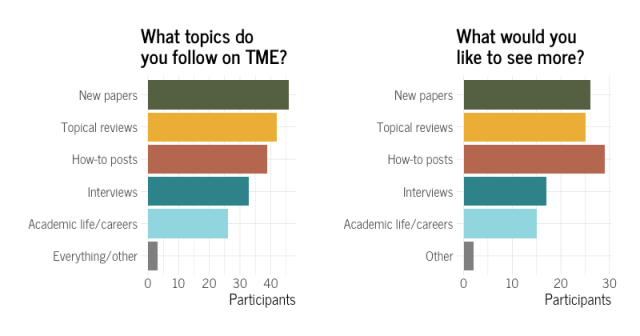
About six months after The Molecular Ecologist‘s tenth anniversary, we’ve hit another round-number milestone — this post is the one thousandth published on the site. I’ll refer you to that anniversary post for a rundown of highlights from the nine hundred and ninety nine that precede it. For this one, I thought I’d turn the focus outward — to our readers, and to what we’ve got to offer in the new year.
Who are you and what are you here for?
Back at the end of October, we put up a quick audience survey. We got 62 responses — not a huge sample, but enough to check our understanding of who’s out there and what brings you here. First, some demographic-ish items: readers’ self-descriptions of their career positions and their fields of expertise. The single best-represented career stage was graduate students, writ broadly (though, shout-out to our one undergrad reader!); the most popular fields of expertise or interest were population genetics and evolutionary biology, followed by ecology.

We also asked about how you read the blog, and I was honestly surprised how big a role our email list played here. Most participants reported finding our posts via multiple modes of delivery, but asked which mode they followed most, our post emails won out with just over half of participants who stated a preference. If you’re not reading this over email, and you’d like to — you can subscribe in the sidebar to the right!

The least-followed modes, on the other hand, are our Facebook page and our podcast. The Molecular Ecologist Podcast is a new endeavor, and we’re still figuring it out, so that’s not surprising. The Facebook page’s poor showing matches what I’ve seen in our traffic data — Facebook disabled automatic posting from WordPress a few years ago, now, and even manually posted links don’t draw the interaction, or the same traffic, that they did when I started with the blog. Between the difficulties of engagement there and the real questions about Facebook’s role in broader public discourse, I think it may be time to close down our page on that network.
The next two questions covered topics: what folks followed on TME, and what they’d like to see more. This is helpful feedback, and it squares with what I see in traffic numbers, again.

Most folks follow, and want more of, our bread and butter: posts about new research, surveys of relevant topics, and how-to explanations of methods of all sorts. There were some good suggestions written in on the second of these items, too: one requested posts “highlighting work of up and coming researchers,” and another posts about “non academia/tenure track career paths”. We’ll see what we can do to provide coverage on those fronts in 2021.
Coming soon, to this fine blog
We’re set to make 2021 another good year for The Molecular Ecologist, even apart from the renewed, if cautious, hope those of us in the USA are feeling right now. Two new regular contributors have joined us for the new year, doctoral student Sabhrina Gita Aninta and postdoc Rishi De-Kayne — look for more detailed introductions of them, and their first posts, soon.
We’re also instituting a new, formal solicitation for paid guest posts, the details of which are on a new policy page. Our hope is that this will provide an opening for more diverse perspectives on the site, both in terms of taxonomic and methodological expertise, and in terms of personal experience. We’ve got the first of these new guest posts queued to go live soon, too. If you have something you’ve wanted to write about that fits with our scope of interest, we want to hear about it.
Thanks, as always for reading! We appreciate the time our readers give us in a busy world of online science news, and we’ll do our best to keep earning it — maybe even for another thousand posts.
Figures in this post use the hrbrthemes theme_ipsum with News Cycle, the typeface from our logo, and the “Everglades” palette from the nationalparkcolors package.
